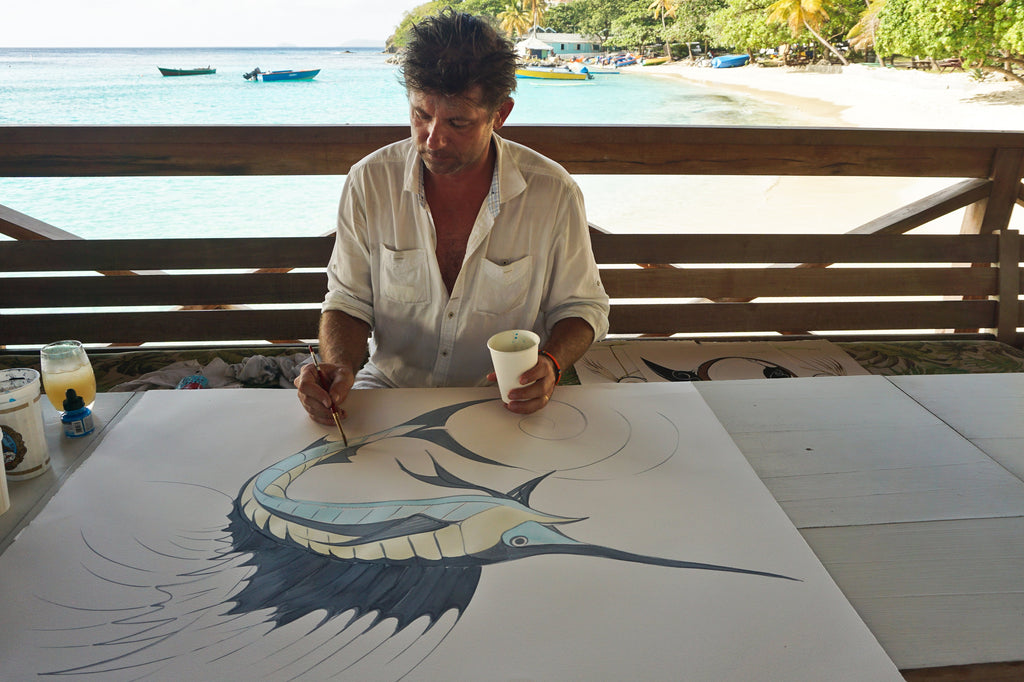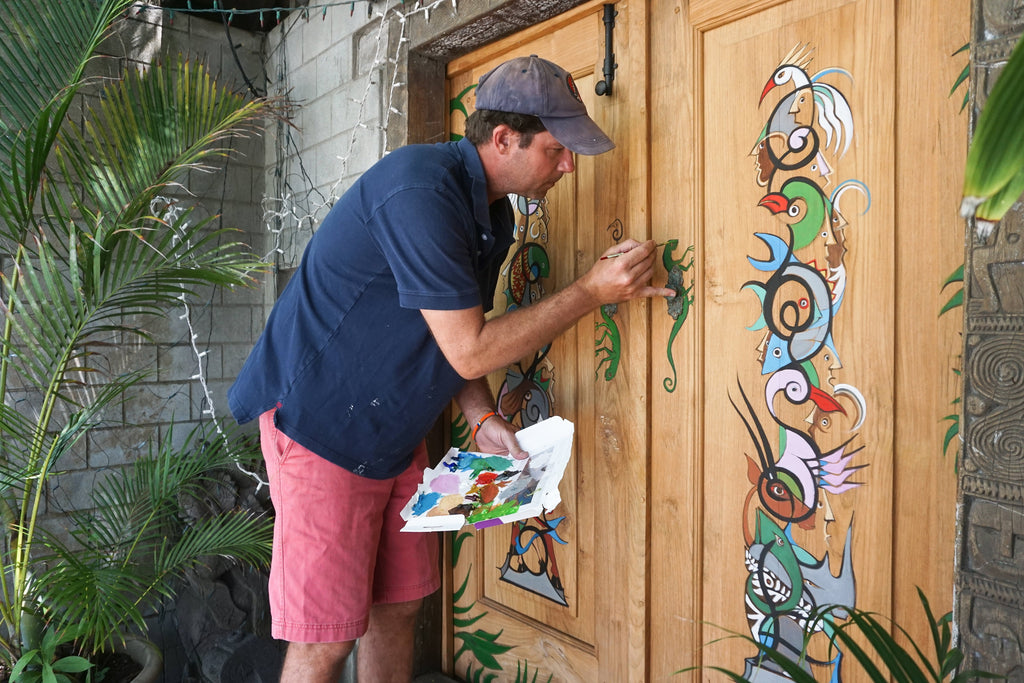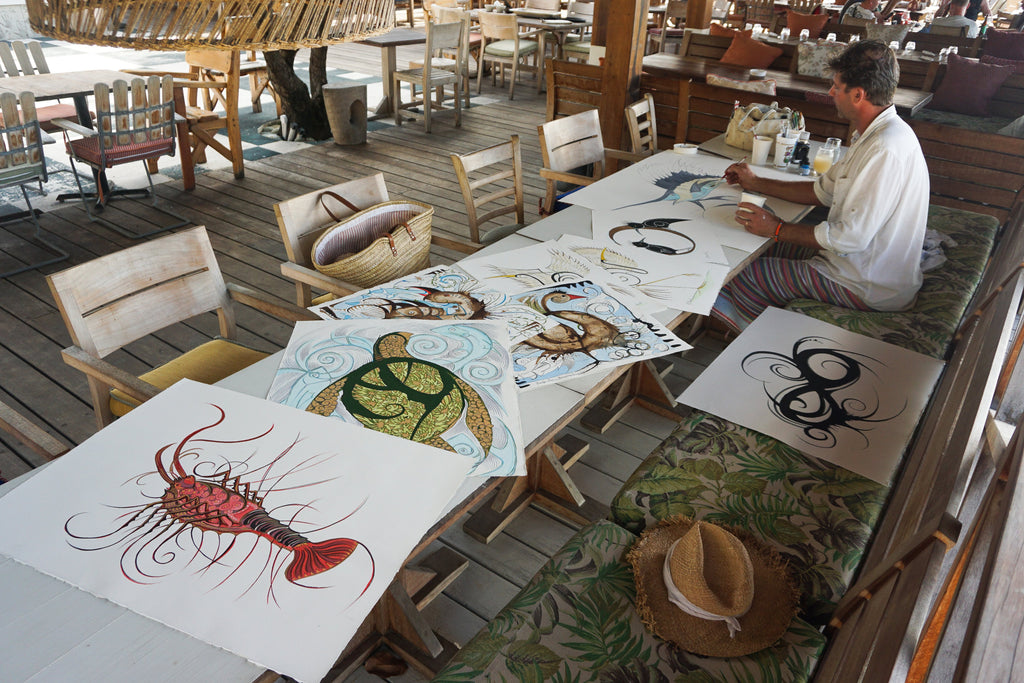
‘This will be my 40th year in Mustique. I first started coming here in 1979, 1980. It was very bohemian and wonderful.’ Gazing out from Basil’s Bar, his favourite painting spot on Mustique, this is how Alex Beard - artist, storyteller, and longtime Mustique regular - begins our conversation. Having planned to meet to talk about his most recent endeavour - a collection for display at the Pink House Mustique - the conversation ends up meandering from memories of Mustique and Princess Margaret through to his contemporary philosophy on art.
Asked about how he started out as an artist, he replies ‘I didn’t really see that there was anything else. I just kept doing it. I never saw that there was a Plan B, or allowed there to be a Plan B. Alex defines his art broadly to encompass writing, painting, and even film; “really it is all storytelling after a fashion.” And, as I am soon to discover, storytelling is certainly a talent of his.

Prompted to recount his favourite story from his many years on Mustique Alex pauses, letting the silence extend as he rolls and lights a cigarette, a challenge in the seabreeze. Cigarette lit, he settles back into the chair and begins. ‘I’ll tell this story in honour of Basil’ he says, by way of introduction. ‘As soon as I was old enough to come and sit at the beach bar I came and made a few paintings and left them down with Basil. A week later he called me up in New York because my paintings had been getting some attention, so I went and spent a winter living with him, and painting.’ As an example of some of his early works, he gestures to the far wall where a memorable portrait of Basil used to hang before the bar’s refurbishment. ‘The big portrait of Basil - I painted that. People would buy them from me and process the sale through Basil and that would basically just about cover my bar tab. I was delighted! That was perfect!
That holiday, Princess Margaret and her whole retinue were on the island and they needed an extra man for lunch, so they invited me. Princess Margaret and I, we weren’t friends exactly because we were very different ages, but we got along well; we were friendly I would say. She said that she would like to come see my paintings, and so I invited her down for a sundowner at the beach bar to show her the art. On the appointed day, she and her whole group came down and we sat at that table’ he points towards the nearest booth ‘she had a little handbag with her little flask in it - she didn’t want anyone to know that she was drinking, and so you would cover her up and she would pour from her flask into her drinks. Anyway, at this point I was in a bit of a Francis Bacon phase; I was working through a lot of feelings. They were macabre paintings. She was older, so I took her arm and walked her around a tour of the paintings, and at the end of it all she looked at me and said ‘Alex you’re a wonderful young man but you make such horrible paintings.’
Alex smiles, unperturbed by the royal criticism and continues, 'I had a lot of fun that year. I was 24. I spent 3 months painting at the Beach Bar. This island is one of my favourite places, but specifically my favourite thing is sitting in the Beach Bar painting. I don’t like navigating a cocktail party crowd. I just sit there and draw and people come to me, and we have a good conversation. People like watching me draw and I like that. Still, every year I come back and paint at the Beach Bar, and over the years I have titled the paintings Basil’s Bar Number 1, Basil’s Bar Number 2 - by now there is quite a collection of them. They’re scattered all over the world!

Over the years, he must have witnessed Mustique change quite a bit I prompt, sending him off into another reverie. ‘More Money - and that’s not a good thing! TVs at the Cotton House Beach Bar, and Air conditioning in every room. The amount of times that people who now sleep with AC used to say “who would want to come here and sleep in an air-conditioned room!” But the thing about Mustique which is still true is that there is a sense of community. It gives consistency in a frayed world. There’s a real family feel - we were kids and now we bring our kids and they will bring theirs. It has all the benefits of being beautiful but there are lots of places that are beautiful - none have this dynamic. There’s a community of people who’ve not just been here forever but that are like-minded. We live in a time when people think they can buy into anything they want rather than earn it - but those people tend to come and go quite quickly I find.
Asked about his sources of inspiration, he replies in characteristic anecdotal fashion before circling back to fully address the question, his mind always 3 steps ahead, crafting the complete narrative. “I had a review once from an art critic who described me as a ‘whale swimming through the ocean with an open mouth, just taking in everything.’ They definitely did not intend it as complimentary, but I totally took it as a compliment - why would you not want to be a whale? Life is too short to be narrow. If people ask me where I get my inspiration from I say that that’s a loaded word. If you wait for inspiration you’re waiting in a dark room for a light to come on. You have to just get down to it.’ And what is “it”? What does he see as his work? He answers with a series of questions - those that he must have posed endlessly to himself to arrive at his artistic philosophy; “I work but what am I? A decorator? A portraitist? What do I do?
The artists role is to seek out truth in beauty and interpret that in a way that is universal enough that people can connect with it, and better interpret themselves in relationship to their surroundings.” This is particularly important at the moment Alex explains because ‘the time in which we live is one in which we are transitioning away from the equilibrium. We are part of a greater system.” This is a fact which Alex addresses in his work through his incorporation of the divine proportions, and his acknowledgment that we ‘are all essentially meat sacks, but we are united by a spirit that is universal…. Achieving equilibrium has always been a challenge, but we are fooling ourselves if we think we can exist in a vacuum. We need our neighbours. As I’ve watched all these systems crash, it strikes me that in the context of perceiving oneself it’s important to populate art with that which I find beautiful in a way that is balanced enough so that when people look at those paintings it brings them a sense of contentment.













Comments
Wonderful article Alex